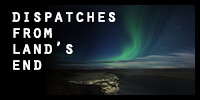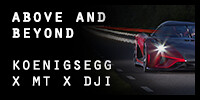Let’s start off with a bit of a definition: the ecosystem covers all of the photography-centric bloggers, reviewers, pro photographers with blogs, corporatized review sites, e-commerce sites that might have some reviews, rumor mills, niche manufacturers of little photo-related widgets, gadget websites that might cover photographic equipment, testing houses, subscription review sites, point-and-click review factories, brand forums, community forums, photo sharing and hosting sites, facebook pages for photographers, columnists, contributors and so on and so forth – anything that’s photography-related, offering an opinion, and online.
This post is going to potentially offend a lot of people, but in the interests of continuing transparency and trust, I feel it is necessary to fully clarify my position.
There seems to be a bit of schism that’s taken place over the last couple of years, as the photography industry has both matured and moved truly into the digital age: correction, the primary consumer market of the photography industry has moved into the digital age. By that, I mean that increasing numbers of camera buyers are actually spending the time reading and then relying on the opinions of a relatively small (but growing) group of reviewers and websites. What I basically mean, is that photography online is becoming very much like either the automotive industry or the hi-fi industry. (I can understand why it’s so important to seek opinions in the auto industry – a car is a large, long-term purchase and you’ll probably only own one or at most two at a time; curiously photographers tend to own dozens of pieces of gear, whose combined purchase price probably exceeds their cars.)
Everybody and their dog (and their dog’s trainer and groomer) have an opinion, and many become self-proclaimed experts overnight.
It’s now both easier and harder than ever to check credibility: the louder a person shouts – and there are some bloggers who shout very loud about nothing much, or worse, illogical nonsense – the more weight an opinion seems to be given. This ‘expert opinion’ becomes repeated, quoted, and taken as gospel – all when the writer probably hasn’t done a shred of research, or worse, said something as a throwaway comment. People who in the real world, are generally sensible and making considered, planned decisions, are now following the town crier with their wallets open and thousands of dollars in their hands. Worse still, major camera makers are encouraging this by supporting the people with the loudest voice – not necessarily the most factual credibility. Where has common sense gone?
Perhaps it’s a case of information overload; the more text we have to read, the less we want to spend time looking for it, and so the first item on Google (or maybe the second, too, if we don’t have any meetings lined up) is all we read. The writers get more and more popular, and it’s a self-destructive cycle. The problem for the camera makers is that in the short term, people will follow the loudest voice. Obviously, this helps to sell a lot of cameras, which is what the companies want. In the longer term, as consumers get more educated, they’ll discover the louder voices are often incorrect, which discredits the previously ‘expert’ loud sources – and individuals are less inclined to trust future claims, which will have a negative impact on sales. It seems that feast now, famine later isn’t a problem for most executives because this year’s bonus assessment is coming up next month, and somebody else will be the one in the middle of the future famine.
As a consumer, you’re spending a not inconsiderable sum of your hard-earned money on something. Make sure that you know yourself, and what you’re going to use it for, before trusting the opinion of somebody who’s never used the item in question for your intended purpose. Most importantly: give weight to the review according to the output, i.e. the images. If a reviewer writes badly but is able to produce stunning images, then chances are they have enough knowledge that their opinion is meaningful. Do not trust reviews with mediocre (or worse, no) images – this is an obvious sign that the reviewer has no clue what they’re doing, and probably doesn’t even know what the equipment is for.
As a manufacturer, there’s a natural inclination to support those who are blindly loyal to promoting your product, especially if it’s at the expense of other companies. Wake up: if you can’t see that using many products gives a reviewer if anything even more credibility, then you might run the risk of being caught with your pants down when your customers (or somebody else with an even louder voice) says something to the contrary. A case of the Emperor’s New Clothes you do not want.
Forums full of equipment-masturbating fanboys are probably the worst hotbed of this kind of activity: people with relatively little knowledge go to seek the company of other people with similarly little knowledge, to try and reinforce the validity of their purchases – sometimes at the expense of common civility, or just being openly hostile to any challengers. Wake up: there is no absolute right or wrong piece of gear, the very reason that there’s a variety is because there’s no such thing as one size fits all. I don’t need my choices to be validated by somebody else to be able to take a good picture – that’s stupid.
One related trend that’s popped up and taken to the fore in the last year or so are the rumor sites: they serve an underlying malcontent insecurity amongst hobbyists who prefer to spend money on equipment in the mistaken belief that it will solve all of their problems and make them instantly better photographers. Worse still, titanically huge noises are made when the rumors aren’t as expected, and people forget that a) most rumors are intentionally leaked by manufacturers; b) nothing that might be released tomorrow will change your skill level or ability today; c) they’re rumors!!
What I really cannot understand is how people – and a lot of popular ‘reviewers’ fall into this category – can pass opinion on something that neither they nor anybody else have physically handled or used, and then treat this as gospel. Once again, the problem is that if something is repeated enough, and a sufficient number of people believe it, it becomes true.
But I’m probably preaching to the choir here: I don’t think the majority of my readers are under the illusion that practice and skill come second to equipment.
And that brings me to the crux of the matter: yes, cameras are now more than sufficiently prolific to be considered consumer goods (and with similarly short life cycles) – but ultimately, the pursuit of photography is about the production of images, not the collection of gear. There is nothing wrong with collecting cameras for the sake of collecting cameras*, or because you enjoy the designs, or for whatever other reason – just don’t confuse it with photography. It annoys me to no end when I’m challenged or criticised by people online, often hiding behind the anonymity of an ambiguous username on a forum, on something I’ve written that perhaps offends them because they purchased something I might have deemed to be slightly inferior to something else, or who insists on arguing a point that makes absolutely no difference in the real world. It is clear that these discussions are pointless, because a) you’re never going to convince a fanatic, but they can definitely waste a lot of your time; b) more often than not, they either haven’t posted a single image anywhere, or certainly none worthy of note: these are not photographers, they’re equipment fetishists.
*I highly doubt that anything mass produced and reviewed by every popular site on the internet is ever going to be collectible; there will simply be too many of them out there to appreciate in value – simple economics.
With that, I want to make some things clear about the principles under which I have so far and will continue to operate this site:
I am a photographer first, a writer second, and an equipment reviewer a distant third.
Everything I write about, I do so because it’s either interesting to me, or because I plan to (or already) use it in my professional or personal work. Time is far too limited for me to review things to promote them for manufacturers (several accusations) or bother testing extensively and reviewing a bad product. That is pointless, especially when I have to spend my own money to buy it!
My methodology is consistent.
I am a scientist by training, and know that a comparison with no baseline or repeatability or consistency in methodology is meaningless. I also know when the results are so close that the differences are within the margin of probable error, it’s impossible to call one superior over another.
If something seems off or unexpected, I double and triple check my results.
If there is a question in the results due to the possibility of sample variation, I will test enough samples to rule this out. The best example of this is the D800 and its focusing issues: I was accused of a) covering up the issue (!!) and b) crying wolf initially. I tested five bodies with a good spread of serial numbers variety of lenses; every single combination exhibited the problem. We can therefore conclude that there is a problem. If it had only been one out of the five, it would most likely be an individual sample defect.
I won’t ever post unedited JPEGs or similar images.
This is like making a judgement on a restaurant by eating half-cooked food. It isn’t giving the equipment a fair chance against other equipment, nor does it take into account the potential – and as a photographer, that’s what I want to have some concrete idea of. Would I buy a camera with crappy JPEGs but incredible RAW files? Of course, because I don’t shoot JPEG for the reason that I’m not maximizing the potential of my equipment.
I don’t do quantitative testing or pixel-peeping.
There are other sites that do this if you’re so inclined; however, sensor and camera technology has long past the point of sufficiency for the vast majority of uses, and even for those of us who make a living from images, our clients haven’t said anything about image quality for some time now (assuming of course you’re maximizing the potential of your camera). The fact that I need 3x higher a shutter speed to handhold adequately, or the fact that I can’t reach several of the major controls without contortion is far more important to me than the fact that the signal-to-noise ratio might be 5% better than its predecessor. One affects the way I work in practice, the other doesn’t.
I try to keep things relative.
In a previous life, I served as Editor and Contributing Editor to a photography magazine for over five years; in this time, I reviewed and used just about every major piece of equipment made; this totals some 300+ reviews. Using a variety of equipment both allows me to pick the best tool for the job, as well as have a good basis for comparison for one piece of gear against another. It’s of course impossible to use everything, but it’s also important to use enough that you can’t get called out for a glaring error.
I am not allied to any brand, though I work with many of them.
The brands I work with are fully accepting of the fact that I do so with no exclusive interest, and because I feel their product is the best for whatever I happen to want to do with it. I have full editorial freedom over what I write. And yes, there are brands and companies (I think you can figure out which ones by elimination) that I do not work with because they insist on censoring everything written first. That completely defeats the point of having an independent review, not to mention undermining everybody’s credibility. Saying something is good when it really is good is fine; it’s when people say something is good when it clearly isn’t that problems of objectivity arise. You won’t see me saying much (if anything at all) bad about most things, because it if’s bad, I won’t waste my time using it, or potentially affect my relationship with the brands by posting something negative that might be later constituted as inflammatory.
If I don’t know something, I’ll admit it.
There are aspects of photography where my knowledge is next to zero – sport, videography etc – and I’ll be the first to admit that. I’ll also not pass opinions on something that I have no knowledge of, or no ability to support through fact or experience.
My opinion is subjective, but I do try to be as objective as possible.
The outcome of any qualitative assessment is open to interpretation; photography very much qualifies as subjective in this regard. It is impossible to completely remove any interpreter bias, even moreso when it comes to the aesthetic considerations of an image – yet this is the area in which I receive the least (almost zero) discussion and challenge, by a long margin. I’ve always strongly encouraged my students and readers to seek a second opinion and not make a choice solely based on what I say; what works for me may not work for you, and what I like may differ from what you like. Seeking the opinions of multiple credible sources helps you to build up a objective, balanced picture – and hopefully make a better decision.
The primary focus of this site remains the creation of images.
From day one, this site has been about the pictures, and the creation of images. Everything else is a tool, technique or enabler, nothing more. It is information for the reader to absorb, and in turn allow themselves to be guided or influenced (or not) as they choose in their photographic journey. I initially didn’t want to review equipment, but eventually saw that it was a necessary part of photography – because so much of the way we see and create is inextricably linked to the tools we use, it is important to have an objective view on these tools from the point of view of a person whose primary focus was images. Don’t get me wrong: I like a good camera or lens as much as the next person (probably more so because I’ve used enough crap to be able to tell the difference) – I just don’t and will never let it be the dominating factor.
One final point: above all else, I value integrity and honesty – it takes a long time and several lucky breaks to build up a solid readership; but only one or two mistakes to erase your credibility. The danger comes when the commercial value of being dishonest is greater than the commercial value of being honest; this site remains a labor of love and a platform for me to share my knowledge with the photography community, and is nowhere close to being my primary source of income. (I think in over the last three months I’ve made a grand total of $400 or so from referral fees; nice pocket money, but not even close to being enough for a decent lens.) This allows me to maintain a level of objectivity that is impossible for pretty much everybody else – and I intend to keep it this way. MT
One final reminder for Malaysians: Today is the last day to enter the Maybank Photography Awards. Lots of great prizes up for grabs – and yes, I’m judging. 🙂
____________
Visit our Teaching Store to up your photographic game – including Photoshop Workflow DVDs and customized Email School of Photography; or go mobile with the Photography Compendium for iPad. You can also get your gear from B&H and Amazon. Prices are the same as normal, however a small portion of your purchase value is referred back to me. Thanks!
Don’t forget to like us on Facebook and join the reader Flickr group!
Images and content copyright Ming Thein | mingthein.com 2012 onwards. All rights reserved





